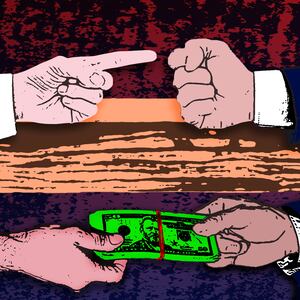Pay Dirt is a weekly foray into the pigpen of political funding. Subscribe here to get it in your inbox every Thursday.
The group of 147 senators and representatives who objected to President Joe Biden’s victory, the so-called “sedition caucus,” faced immediate donor backlash after the Jan. 6 insurrection. But they still raised a staggering amount of money for the 2022 election cycle—nearly $200 million.
To put that in perspective, it’s about $60 million more than former President Donald Trump’s Save America apparatus raised during the same period. The national fundraising arms for House and Senate Republicans raised $262 million and $234 million, respectively.
About $77.7 million came from individual donors, with another $121.5 million from other federal committees, including campaigns, joint fundraising vehicles, corporate PACs, trade associations, and other special interest groups, according to The Daily Beast’s review of Federal Election Commission bulk contribution data for the cycle, covering through Oct. 31, 2022.
The raw contribution data was compiled by Advance Democracy, an independent, nonprofit organization that conducts public-interest research, and analyzed by The Daily Beast.
The sedition caucus also features some of the top congressional fundraisers overall.
In the House, six of the top 10 Republican money draws this cycle were election objectors, with Minority Leader Kevin McCarthy leading the pack, followed by Minority Whip Steve Scalise, according to data from the Center for Responsive Politics. Of the five candidates on that list who raised more than $10 million, only one voted to uphold Biden’s win: Rep. Dan Crenshaw (R-TX).
Only one of the seven objectors in the Senate was up for election this year, Sen. John Kennedy (R-LA), who according to CRP pulled in $37.5 million for his successful re-election. Also on Tuesday, Rep. Ted Budd (R-NC) moved from the House to the Senate, winning his bid in North Carolina. (Budd’s Senate campaign raised about $12.6 million through Oct. 19, which puts him among the top 10 GOP fundraisers in the House, but doesn’t crack the top 20 for Senate Republicans, according to CRP totals.)
Things also get interesting on the donor side.
In the wake of the Jan. 6 attack, more than 120 corporations pledged to suspend political donations to Republicans who voted to overturn the election. But the data shows that, while many businesses kept that pledge, a number of major companies turned the spigot back on.
According to the data, as of Oct. 31, eight companies—Koch Industries, AT&T, Comcast, American Crystal Sugar Company, UPS, Lockheed Martin, Boeing, and Valero—had given more money this cycle to committees affiliated with election objectors than the Republican National Committee, the National Republican Congressional Committee, and the National Republican Senatorial Committee. All but one of those eight companies had promised to pause donations in some form after the insurrection, with American Crystal Sugar being the outlier.
In all, the data shows that 68 private companies contributed at least $100,000 to committees connected with lawmakers who rejected Biden’s victory. (The dataset includes leadership PACs and other officially affiliated groups in addition to campaign committees.)
The largest private donor on the list is billionaire GOP megadonor Dick Uihlein. The Uline shipping mogul fanned out about $405,000 to the sedition caucus, spread across more than two dozen committees, with his wife Elizabeth throwing in another $280,000. Other notable megadonors include hedge fund honcho Ken Griffin ($280,800), Home Depot founder Bernie Marcus ($266,300), and Boston Celtics co-owner Rob Hale, who handed over $260,500 to the Scalise Leadership Fund.
But the largest individual donor on the list was himself an election objector. That would be Rep. Madison Cawthorn (R-NC), who dumped nearly $445,000 of his own money into his re-election bid, which collapsed spectacularly under the weight of scandal and mismanagement this May. As Pay Dirt previously reported, Cawthorn has personally invested a total of $817,000 into his political efforts since 2019. He has so far recovered only $261,000, leaving him on the hook for $556,000.
While it’s clear that the sedition caucus did pretty well at the bank, the political outcome is still uncertain.
Voters shot down election-denying Republican candidates for governor, secretary of state, and attorney general in a number of key races this week, part of a more broad repudiation of what many conservatives believed would be a red wave. But as of Wednesday night, more than three dozen candidates who rejected Biden’s election had themselves claimed victory, according to The New York Times, with 180 of the House winners—more than a third—having questioned or denied the 2020 results.
But as of Wednesday night, a number of key contests remained unresolved—most notably Rep. Lauren Boebert (R-CO), who was still slightly underwater in a surprisingly tight race. Not counting Budd, Boebert is the 10th-strongest Republican fundraiser in the House.








